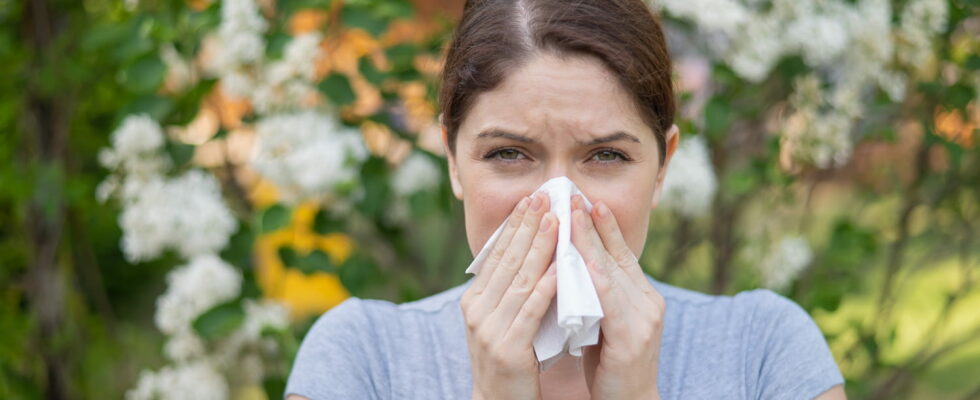The week is very hard for allergy sufferers…
Tired, “full” head, red eyes, nose running like a fountain… Currently, “Grass pollens are very abundant in the air and seriously bother those with allergies, the risk of allergies is high throughout the country” inform him RNSA. Pollen is produced in abundance during the plants’ flowering period, when the flowers are open and ready to be pollinated (which is right now!). “Trees pollinate in December, grasses in April until June and herbaceous plants all summer until September.” explains Dr Maxime Hosotte, allergist at the Nancy-Lorraine Private Hospital. The season is therefore far from over and the return of the sun aggravates the situation.
Pollen can be carried by insects (entomophilic pollen) or by the wind (anemophilic pollen). Pollen carried by wind is lighter and can travel up to thousands of kilometers. When pollen comes into contact with the nasal mucous membranes, it can trigger a reaction in people with allergies. “This allergic reaction is characterized by a release of histamine and other inflammatory substances by the immune system to fight what it perceives as a threat“, adds the doctor. These substances then cause a series of responses in the body: itchy nose, sneezing and increased production of mucus.
“When the nasal mucous membranes are irritated, the brain will trigger a sneeze reflex to expel allergens and irritants from the respiratory tract”
“When the nasal mucous membranes are irritated, the brain will trigger a sneeze reflex to expel allergens and irritants from the airways.“. Pollen can also cause conjunctivitis with itchy, runny eyes andinflammation of the respiratory tract responsible for coughing or even asthma. “Some studies have shown that there is a genetic component to the predisposition to allergies, including pollen allergies.recognizes our interlocutor. People whose parents or close family members have a history of allergies are more likely to develop allergic reactions, including sneezing in response to pollen” underlines our interlocutor. Likewise, “people living in areas with high pollen levels, or those who are exposed to high pollen concentrations during plant pollination season, are more likely to develop allergic reactions“.
Treatment of sneezing caused by pollen aims to reduce symptoms to improve the quality of life of those affected. We start with an allergy assessment to try to identify the allergen responsible for sneezing. Exposure to pollen should also be avoided as much as possible. To do this, stay indoors during periods of high pollen concentration, keep windows closed, use an air conditioner with an air filter, take a shower (and wash your hair) and change clothes after going out to the bathroom. outside. In addition, antihistamines may be prescribed:They block the effects of histamine and thus reduce sneezing, itching, runny nose and red, irritated eyes..
Local anti-inflammatories such as nasal corticosteroids can also be used. Finally, allergen immunotherapy or “desensitization” makes it possible to reduce the sensitivity of the immune system to pollen by gradually administering increasing doses of pollen. “It is a long-term treatment that can help reduce the severity of allergy symptoms and improve pollen tolerance. It has proven its effectiveness”. It is done by tablet (or aqueous solution) and is often considered over 3 successive seasons of 6 months.
Thanks to Dr Maxime Hosotte, allergist at the Nancy-Lorraine Private Hospital (Elsan)
